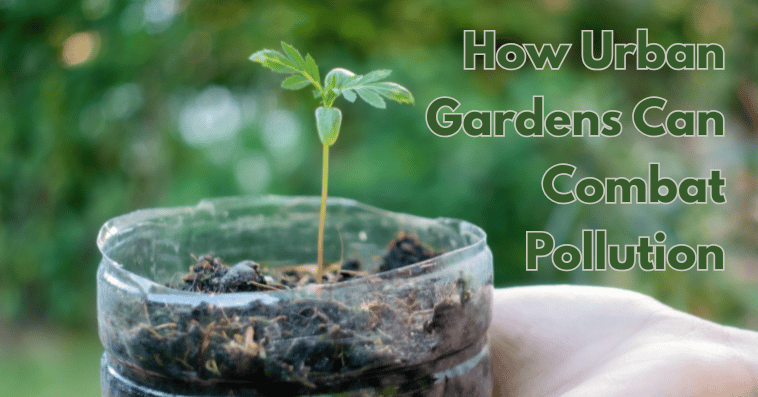As cities expand and concrete jungles replace natural spaces, urban pollution has become a serious threat to health and the environment. From smog-filled skies to rising temperatures and declining air quality, urban residents are paying a high price for development. But there’s a silent, beautiful revolution taking root—urban gardening.
Urban gardens aren't just a trend or aesthetic addition; they are natural air purifiers, carbon sinks, and eco-friendly warriors in the battle against pollution. Whether you're a passionate gardener, an apartment dweller, or a sustainability enthusiast, starting an urban garden can make a measurable difference. Let’s dig into how urban gardens can reduce pollution—and how you can start yours today.
1. Urban Gardens: The Lungs of the City
One of the most immediate benefits of urban gardening is air purification. Plants absorb carbon dioxide and release oxygen, but their magic doesn’t stop there. Many plants also absorb harmful pollutants such as nitrogen dioxide, ozone, benzene, and particulate matter.
For instance, species like snake plants, spider plants, and peace lilies are known for their air-purifying properties. In fact, studies by NASA and environmental agencies show that greenery significantly reduces indoor and outdoor air pollutants, especially in traffic-heavy zones.
2. Reducing the Urban Heat Island Effect
Cities tend to be hotter than surrounding rural areas, a phenomenon known as the Urban Heat Island Effect (UHI). Why? Asphalt, metal, and glass surfaces absorb and radiate heat while natural green spaces are few and far between.
By adding more green cover through rooftop gardens, vertical gardens, and balcony plants, urban dwellers can combat heat buildup. Plants cool the environment by providing shade and through a process called evapotranspiration, where they release moisture into the air. This not only reduces your dependency on ACs but also lowers greenhouse gas emissions.
3. Capturing Dust and Airborne Particles
Ever wiped a dusty leaf? That dust is part of what's floating in the air you breathe.
Urban gardens act as dust traps, filtering airborne particles that would otherwise enter your lungs. Tall hedges, climbers, and vertical garden panels are especially useful in high-traffic zones or near construction sites. Even simple balcony plants can reduce the amount of dust entering your home.
Pro tip: Grow dense-leaved shrubs like ficus or areca palms to act as natural pollution barriers!
4. Noise Pollution Reduction
You may be surprised to learn that urban gardens also help with noise reduction. Foliage and plants act as natural sound absorbers, diffusing and reflecting sound waves. For those living near busy roads, railways, or construction zones, adding thick green walls or vertical gardens can significantly dampen unwanted noise and create a peaceful environment.
5. Carbon Sequestration and Climate Benefits
Urban gardens contribute to carbon sequestration, the process by which plants absorb and store carbon dioxide from the atmosphere. While one small garden won’t reverse climate change, collective efforts across homes, terraces, and communities can make a noticeable impact.
Community gardens and urban farms also reduce the need to transport produce over long distances, thereby cutting down on vehicle emissions. When you grow your own food—even if it’s just herbs or leafy greens—you directly lower your carbon footprint.
6. Waste Reduction Through Composting
Most urban gardeners practice organic composting, converting kitchen waste into nutrient-rich soil. This not only reduces landfill waste but also lowers methane emissions, a potent greenhouse gas.
A home composter in your balcony or backyard can handle fruit peels, coffee grounds, eggshells, and even old leaves. When used in your urban garden, this compost boosts plant health, minimizes the need for chemical fertilizers, and contributes to sustainable waste management.
7. Water Management and Pollution Control
Urban runoff—stormwater mixed with pollutants—can overwhelm drainage systems and contaminate water bodies. Gardens, however, slow down water flow, letting it seep into the ground naturally and filter pollutants.
Techniques like rain gardens, bioswales, and raised beds in urban gardens are excellent for water conservation. You can also install a rainwater harvesting system to irrigate your plants and reduce water waste.
8. Psychological Benefits & Community Wellness
While the primary focus is on environmental impact, the mental health benefits of gardening cannot be ignored. Gardening is therapeutic, lowers stress, and fosters a sense of community.
Cleaner air, cooler surroundings, and lush greenery contribute to better sleep, fewer respiratory issues, and higher productivity levels—especially important in densely populated urban areas.
Ready to Start Your Urban Garden? Here's How:
Urban gardening doesn’t require acres of land. Here’s what you can start with:
- Balcony planters or railing pots for herbs and flowers
- Vertical gardens for tight spaces and air filtration
- Terrace gardens with vegetables and fruiting plants
- Indoor potted plants like areca palm, peace lily, or ZZ plant
- DIY compost bins to reduce kitchen waste
And if you’re looking for high-quality, affordable plants, planters, seeds, and gardening tools—all curated especially for urban spaces—buy it from PaudheWale. They offer sustainable gardening products delivered right to your doorstep.
Conclusion: Small Garden, Big Impact
Urban pollution may seem like an overwhelming problem, but every small step counts. By embracing urban gardening, you're not just decorating your home—you’re actively cleaning the air, reducing waste, cooling your environment, and contributing to a sustainable future.
So, let your home be more than just a shelter. Let it become a sanctuary. Let it fight pollution.
Grow green. Breathe clean. Start your garden with PaudheWale today.

